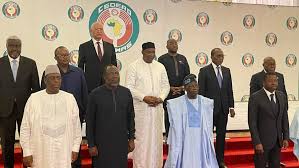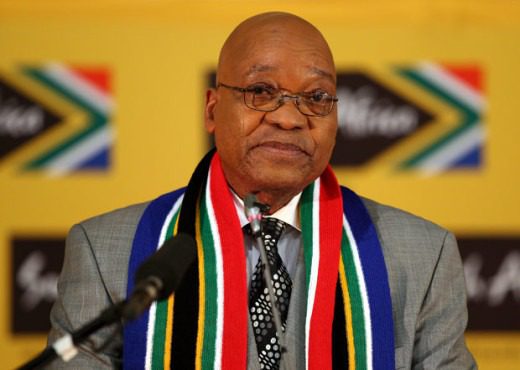Global Issues
Niger Republic; ECOWAS Leaders As ‘Strange Liberators’ -By Jerome-Mario Chijioke Utomi
This piece underlines that top on the list of these factors are; flagrant disregard by elected public office holders, of public opinions, ignoring advice/admonitions from well-meaning Africans and groups, paying no attention to political and socioeconomic concerns expressed by the people, undermining political , socioeconomic and democratic institutions and exercising of power and responsibility, not as a trust for public good but as an opportunity for private gains among others.

I cannot situate exactly how I first encountered this phrase: “Strange liberators”, but I think it was while studying the words and speeches of Martin Luther King Jnr where it was used as a title for a piece on the role played by the American government in Vietnam.
Luther in that account stated thus; ”I speak now not of the soldiers of each side, not of the junta in Saigon, but simply of the people who have been living under the curse of war for almost three continuous decades now. I think of them too because it is clear to me that there will be no meaningful solution there until some attempt is made to know them and hear their broken cries. They must indeed have seen Americans as strange liberators”. He concluded.
The above quote came flooding after reading a news report that in compliance with the directives of the Economic Community of West African States, the Defense Headquarters has commenced build-up preparations for the possible mobilization of troops and equipment for a possible confrontation with the junta in Niger Republic. It was well reported that the purpose of the above directive is to use military might to force the junta, which overthrew President Mohamed Bazoum on July 26, out of power and to reinstate the Nigerien President.
Indeed, it will be naïve of this piece to proceed without making the following distinctions.
First, it is extremely important for us as Africans to be clear among ourselves that the ‘episodic coup d’état in Niger Republic remains repugnant, obnoxious, condemnable and can never be supported by any right thinking African. In fact, there is presently no credible alternative to democracy.
Again, to be far to the leadership of Economic Community of West African States, there is nothing wrong with war when viewed peripherally. War is considered a lawful violence so far it meets with these three conditions; ‘waged by the lawful public authority in defense of the common good, waged for a just cause, and waged with the right intention, not vengefully nor to inflict harm’.
But beyond these tangential considerations, there is everything wrong with the latest decision by the ECOWAS leadership. Without doubt, these leaders may have good intentions with their insistence on re-install democracy in Niger Republic, but their strategy and tactics portrays them as ‘strange liberators’. Not even the Nigeriens, the targeted beneficiaries of the proposed intervention will spare them of such description.
This particular postulation is not by any means groundless.
Aside from being ill timed coupled with the new awareness that when soldiers are in the field, the resources of the state/continent shall be depleted, and plunder the nascent economic space of the continent into a more chaotic situation, there are glaring reasons as to why the ECOWAS leadership must rethink the proposed war and in its place, seek victory that will render further aggression unnecessary.
As noted elsewhere, history demonstrates that the political logic of war is ill-served by a too narrow focus on policy, since this logic is also determined by other political forces and conditions, such as the composition of the polity and domestic power struggles. Politicians in every era, it was observed, have pursued foreign policies they believed were detrimental to national interest but nevertheless persisted in their course because their thinking was dominated by concerns of power.
Similarly , ‘based on the deduction that politics consists of the core concepts of policy, power and polity, many scholars have concluded that the field has lost its relevance, traditional war has become obsolete and strategy merely an illusion’.
Another reason why the current ‘politics of war’ by the President Bola Ahmed Tinubu led ECOWAS body must be dropped, is predicated on strategic insights from religious and global communities.
While those with religious inclinations argues that war fare can no longer be supported or trusted as means of conflict resolution -as the consequence of such exercise or the degree of causalities cannot be predicted, and suggests- gospel and moral situation as way forward, the global community, advocates that any nation desirous of survival and development, must apply global accounts of previous wars in its day to day administration. Such knowledge without a shadow of the doubt has the capacity to promote understanding between individuals, communities, states, nations and regions of the world as well as bring about structural changes in concept and gradual displacements of this long held view about war.
Leaders in Africa need to recognize that the effects of such dangerous and unsustainable war decisions taken in the past are presently similar in consequence to the present plan for another self-destruction. As a continent, we cannot be doing one thing repeatedly and expect different results. We must not fail to remember also that the longer we allow such thoughtless decisions to continue in Africa, the greater the harm and the more serious the risk. It calls for a rethink.
Also worrisome and worrying is the awareness that the list of actions not taken by President Tinubu and other leaders from West Africa to resolve the impasse remains lengthy. These leaders for example have not been exhaustive in diplomacy and strategic negotiation.
From this standpoint, it will be an unproductive venture proposing a solution without first underlining why coup d’etat is still considered an option/fashionable in not just West Africa but Africa as a continent.
This piece underlines that top on the list of these factors are; flagrant disregard by elected public office holders, of public opinions, ignoring advice/admonitions from well-meaning Africans and groups, paying no attention to political and socioeconomic concerns expressed by the people, undermining political , socioeconomic and democratic institutions and exercising of power and responsibility, not as a trust for public good but as an opportunity for private gains among others.
Close to the above is the reality that Africa is a continent where tribal loyalties seem stronger than the sense of common nationhood, a state of affairs that blurs our vision about public leadership and promotes nepotism, cronyism and corruption while making our political judgments bigoted.
There exists also gross poverty of history in the continent, a condition that roundly prevents leaders in the continent and their supporters from learning from the consequences that befell some of the past African leaders that ignored such warning signals. In our living memories are: Robert Mugabe of Zimbabwe, Gnassingbe Eyadema of Togo and Mobutu Seseseko of Zaire, among others.
From Zimbabwe to South Africa, Kenya down to Nigeria, the story is the same: penchant for ignoring advice, warning signals, and inability to read the political handwriting on the wall.
Most practical and recent experience is Mr Raila Odinga of the People’s Republic of Kenya, who in 2018 had himself, illegally sworn-in as the parallel president of the Republic, despite his non-participation in the rescheduled presidential election in Kenya.
With this move, Odinga, as an average African ‘leader’ demonstrated his political blindness and proved to the world that public opinion makes little or no sense to him. To Odinga, it was not about the people but personal aggrandizement. To him, it is not about service but selfishness.
Looking ahead, it is obvious that; if truly a people-purposed leadership is what we seek in Africa, if accelerated economy is our goal, if social and cultural development is our dream, if promoting peace, supporting our industries and improving our energy sector form our objectives, then, the solution to these critical demands calls for overwhelming urgency and demand a generational change.
Why? The reason is that Africa as a continent has talented and well educated youth who can build a modern continent.
As the debate rages, this piece holds the opinion that killing a fellow African via war in the name of re-installing overthrown President Mohamed Bazoum, will earn ECOWAS leaders neither honour nor glory. Thus, the option of war must be jettisoned without delay.
Rather ‘repentance’ by African leaders from political mis-leadership, will without doubt, render coup d’etat in Africa unnecessary. The economy of the continent on its part will look after itself if democracy is protected, human rights are respected, and the rule of law is strictly adhered to by these so-called leaders.
This is the only possible solution.
Jerome-Mario Utomi, Programme Coordinator (Media and Policy), Social and Economic Justice Advocacy, Lagos. jeromeutomi@yahoo.com Or 08032725374




















